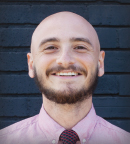A lot of my experience with cancer is hazy to me. I was taking narcotics for pain around the clock when I was diagnosed with Ewing’s sarcoma in 2013, so there are some missing memories during those early days.
I was 19 and a freshman in college when my symptoms started. I have always been active in sports and was on the field a lot playing Ultimate Frisbee when I pulled a groin muscle that never got better. All the pain was centered in my left hip and leg, and it would come in waves so severe it kept me up at night. Eventually, I had trouble walking and nearly completely lost the use of that leg.
When I went home during a semester break, my father, who is a radiation oncologist, immediately recognized the seriousness of my situation and drove me to a hospital emergency room. There, a magnetic resonance imaging scan showed a 19-cm tumor lodged in my left pelvis. A biopsy the next day determined I had cancer, and 2 days later, I started a chemotherapy regimen of vincristine, doxorubicin, and cyclophosphamide, alternated with ifosfamide and etoposide.

Alec Kupelian
The day after I got the biopsy results, my parents drove me to college to pack up my belongings. I had just a few hours to say goodbye to the collegial life I had been so looking forward to and the friends I had made. Once excited about the future I had envisioned in a career in science, now I had to leave that dream behind. My future was uncertain; I didn’t even know if I would have a future.
Even though I was living through the effects of cancer moment by moment, I still somehow felt separate from the experience. There was a sense it was all theoretical and, in some way, not tangible. As difficult as this time was for me, I could see cancer was affecting my whole family. My parents split up responsibilities for my care, and as strong as they tried to be for me, I could tell they were worried and scared; that meant I had to put on a brave face and be okay for them. It wasn’t until much later, after my first suicide attempt, that I realized how traumatizing my cancer diagnosis was to me.
Nothing Is the Same After Cancer
During my 11 months of chemotherapy, I was in the hospital for a week every 2 weeks. At one of those hospital stays, I remember the surgeon coming in to tell me she was going to cut out my left hip and I would never walk or run normally again, but at least it was better than dying. I admit, I was on a lot of pain medications at the time, but those words are etched in my brain.
As an athlete, which I was still hoping to be after cancer, my physical abilities are very important to me, and the surgeon’s words were crushing. Fortunately, my father advocated for a different approach. He looked over the treatment plan and said that even if surgery was necessary to completely remove the remaining mass chemotherapy had left behind, I would still need radiation therapy first to further shrink what was left of the tumor. My father suggested instead 6 weeks of aggressive radiation therapy to see if it could eradicate the cancer and preserve as much of my long-term quality of life as possible.
Because of my father’s advocacy, I still have my left hip. But after 8 years of being declared cancer-free, nothing is the same—not my physical health nor my emotional health.
Staying Vigilant
Although I still enjoy competing in my favorite sport of Ultimate Frisbee, physically, I am not at the same level of athleticism I had before cancer. I have treatment-related osteoporosis and have broken many bones (including my right collar bone, two ribs, and my right foot) and torn the labrum in my right shoulder, playing sports.
However, my most concerning issue is my fragile mental health. It took me 5 years to finally complete my undergraduate degree in Earth science because of treatment-related cognition and memory issues. Most troubling are bouts of depression and anxiety, so severe that some days I am unable to get out of bed.
Probably, the worst time of my life was the year after treatment, when everyone expected me to be fine, but I was anything but fine. I had started drinking to the point of blacking out and had become addicted to prescription narcotics. I had my second and third suicide attempts during my last year of college.
I realize now that my anxiety and depression levels peak during times of transition. With the help of therapy and antidepressants, I’m better able now to spot the warning signs of impending spiraling depression and implement management techniques earlier to ward off its devastating effects. But it takes constant vigilance to stay mentally healthy.
Taking the First Step
My work as Program Development and Operations Manager at Teen Cancer America (teencanceramerica.org), a nonprofit organization dedicated to increasing and improving the lives of adolescent and young adults with cancer, has helped me better understand the impact of cancer both on patients and clinicians. I’m finding answers to questions that have long plagued me about my experience with cancer and what my medical team did well and not so well.
In the past, I didn’t believe the future was mine to have and couldn’t envision a life with a fulfilling career and romantic relationships. But today, I’m starting to tentatively allow myself to be excited about what lies ahead. I’m not fully convinced yet, but it’s a great first step.
Mr. Kupelian is the Program Development and Operations Manager at Teen Cancer America and lives in Portland, Oregon
Editor’s Note: Columns in the Patient’s Corner are based solely on information The ASCO Post received from patients and should be considered anecdotal.

